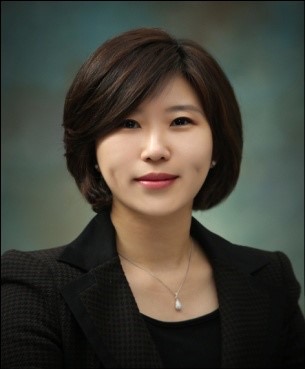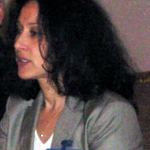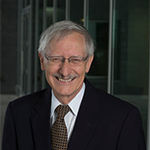Ellen Laipson is the Director of the Center for Security Policy Studies and the Director of the International Security program at the Schar School of Policy and Government at George Mason University. She joins GMU after a distinguished 25 year career in government and as President and CEO of the Stimson Center (2002-2015). She serves on a number of academic and other non-governmental boards related to international security and diplomacy and is a weekly columnist for World Politics Review. Her last post in government was Vice Chair of the National Intelligence Council (1997-2002). She also served on the State Department’s policy planning staff, the National Security Council staff, and the Congressional Research Service. A member of the Council on Foreign Relations, she serves on the Advisory Councils of the International Institute of Strategic Studies, the Chicago Council on Global Affairs, and Georgetown University’s Institute for the Study of Diplomacy. She served on the board of the Asia Foundation (2003-2015). She was a member of the CIA External Advisory Panel from 2006-2009, President Obama’s Intelligence Advisory Board from 2009-2013, and on the Secretary of State’s Foreign Affairs Policy Board 2011-2014. Laipson has an M.A. from the School of Advanced International Studies, Johns Hopkins University and an AB from Cornell University.
Michael Hunzeker is an Associate Director of the Center for Security Policy Studies and is an Assistant Professor at George Mason University’s Schar School of Policy and Government. His studies on war termination, military adaptation and simulation design have appeared in Security Studies, the Journal of Strategic Studies, PS: Politics and Political Science, Parameters, Defense One and the Marine Corps Gazette. Michael holds an A.B. from the University of California, Berkeley as well as a Ph.D., M.P.A., and M.A. from Princeton University’s Woodrow Wilson School and spent 15 years in the Marine Corps and Marine Corps reserve. Click here for a list of publications.
Philip Martin is an Associate Director of the Center for Security Policy Studies and is an Assistant Professor of International Security at the Schar School of Policy and Government at George Mason University. He teaches courses on conflict and peacebuilding, comparative politics, and Africa. His research focuses on the legacies of civil wars for state formation and democracy, using archival, interview, and survey-based methods. His book project, Insurgent Armies: Explaining Military Loyalty after Rebel Victory, examines civil-military relations and ex-rebel commander behavior in countries ruled by former armed movements. His research has been published or is forthcoming in outlets such as Comparative Politics, African Affairs, Civil Wars, and Foreign Affairs. Dr. Martin has worked and conducted research in Côte d’Ivoire, Zimbabwe, South Africa, Botswana, and Tajikistan. He received a PhD in Political Science from the Massachusetts Institute of Technology.
Soyoung Kwon is the Branch Director of CSPS Korea and is an Assistant Professor of Government at George Mason University, Korea. Prior to joining us, she taught and conducted research as a research associate fellow at University of Cambridge’s East Asia Institute and as a Shorenstein fellow at Stanford University’s Asia Pacific Research Center. She served as a Korean specialist and advisor on EU-Korea relations at Belgium’s European Parliament and international relations advisor at an international sports organization. She taught at the Kyung Hee University’s Graduate School of International Studies and at Chonbuk National University’s Faculty of International Studies. She is a research associate fellow at Yonsei University’s Yonsei Institute for North Korean Studies and an International Sports Relations Foundation board member. Her main areas of interest are comparative politics, international relations, North Korean studies, inter-Korean relations, peace and security in Northeast Asia, and sports for development and peace. Prof. Kwon received her bachelor’s degree in political science and diplomacy from Ewha Womans University, her first master’s degree and doctorate in social and political sciences from University of Cambridge, and a second master’s degree from Stockholm University. Click here for a list of publications.
Sonia Ben Ouagrham-Gormley is an Associate Professor in the Schar School of Policy and Government at George Mason University. She holds affiliations with GMU’s Biodefense Program, Center for Global Studies, and the Department of History and Art History’s Master of Arts in Interdisciplinary Studies (MAIS) program. She received her PhD in Development Economics from the Ecoles des Hautes Etudes en Sciences Sociales (EHESS) in Paris; a graduate degree in Strategy and Defense Policy from the Ecoles des Hautes Etudes Internationales in Paris; a master’s degree in Applied Foreign Languages (triple major in economics, law, and foreign languages —Russian, and English) from the University of Paris X-Nanterre, and a dual undergraduate degree in Applied Foreign Languages and English Literature from the University of Paris X-Nanterre. Prior to joining the GMU faculty in 2008, Professor Ben Ouagrham-Gormley was a Senior Research Associate with the Monterey Institute of International Studies’ James Martin Center for Nonproliferation Studies (CNS). While at CNS, she spent two years at the CNS Almaty office in Kazakhstan, where she served as Director of Research. She also was the founding Editor-in-Chief of the International Export Control Observer, a monthly publication focusing on proliferation developments and export controls around the globe. From 2004 to 2008, she was an adjunct professor at Johns Hopkins’ School of Advanced International Studies in Washington, D.C. Professor Ben Ouagrham-Gormley has conducted research and written on such topics as nuclear, chemical, and biological weapons proliferation, organization and management of weapons programs, WMD trafficking in states of the former Soviet Union, biosecurity and bioterrorism, bio-dissuasion, export controls, defense industry conversion, transfer mechanisms of WMD expertise, and redirection of WMD experts. She has received several grants from the Departments of Defense, State, and Energy, as well as from the Nuclear Threat Initiative and the Carnegie Corporation of New York to conduct research on WMD proliferation and contribute to remediation programs such as the DOD-funded Cooperative Threat Reduction Program. Click here for a list of publications.
Ahsan I. Butt is an Assistant Professor at the Schar School of Policy and Government at George Mason University. His main research interests lie in nationalism, international security, and South Asia. He is currently writing a book on separatist violence. His work has appeared in peer-reviewed journals such as Conflict, Security, and Development and International Organization, and has received generous support from the Belfer Center for Science and International Affairs at the Harvard Kennedy School, the Mellon Foundation, the Stanton Foundation, and the United States Institute of Peace. Click here for a list of publications.
Sara Cobb is the Drucie French Cumbie Professor at The School for Conflict Analysis and Resolution (S-CAR) at George Mason University, where she was also the Director for 8 years. In this context she teaches and conducts research on the relationship between narrative and violent conflict; she is also the Director of the Center for the Study of Narrative and Conflict Resolution at S-CAR that provides a hub for scholarship on narrative approaches to conflict analysis and resolution. Formerly, she was the Director of the Program on Negotiation at Harvard Law School and has held positions at a variety of tier one research institutions such as University of California, Santa Barbara, University of Connecticut, and more recently at the University of Amsterdam. She has also consulted to and/or conducted training for a host of public and private organizations, including UN High Commission on Refugees, UNDP, La Caxia Bank, and Exxon, the American Bar Association, Fox Learning Academy as well as a number of universities in Europe and Latin America. She has been a leader in the fields of negotiation and conflict resolution studies, conducting research on the practice of neutrality, as well as the production of “turning points” and “critical moments” in negotiation processes. Some of this research is based on case studies from her field research in Guatemala, Chile, Rwanda and the Netherlands. She received her Ph.D. from University of Massachusetts, Amherst. Click here for a list of publications.
Guadalupe Correa-Cabrera (Ph.D. in Political Science, The New School for Social Research) is Associate Professor at the Schar School of Policy and Government, George Mason University. Her areas of expertise are Mexico-U.S. relations, organized crime, immigration, border security, and human trafficking. Her newest book is titled Los Zetas Inc.: Criminal Corporations, Energy, and Civil War in Mexico (University of Texas Press, 2017). She was recently the Principal Investigator of a research grant to study organized crime and trafficking in persons in Central America and along Mexico’s eastern migration routes, supported by the Department of State’s Office to Monitor and Combat Trafficking in Persons. She is now working on a new book project that analyzes all aspects of Mexican irregular immigration in the United States entitled Mexican “Illegal” Immigration in the U.S.: A Human Problem. Dr. Correa-Cabrera is currently the President of the Association for Borderlands Studies (ABS). She is also Global Fellow at the Woodrow Wilson International Center for Scholars and Non-resident Scholar at the Baker Institute’s Mexico Center (Rice University).
Robert L. Deitz was Senior Councillor to the Director of the Central Intelligence Agency from 2006 until February 2009. From September 1998 to September 2006 he was the General Counsel at the National Security Agency where he represented the NSA in all legal matters. He has also held positions as Acting General Counsel at the National Geospatial-Intelligence Agency and as Acting Deputy General Counsel, Intelligence, at the Department of Defense. Professor Deitz began his career as a law clerk to the Honorable Justices Douglas, Stewart, and White of the United States Supreme Court. He has also been in private practice and was Special Assistant to Deputy Secretary of State Warren Christopher and to Secretary of Health, Education and Welfare Joseph Califano during the Carter Administration. Professor Deitz received his J.D. (magna cum laude) from Harvard Law School, where he was the Supreme Court Note and Note Editor of the Harvard Law Review. He received an M.P.A from the Woodrow Wilson School of Public and International Affairs at Princeton University, where he studied international politics and economics. He majored in English literature at Middlebury College where he received a B.A. (cum laude) and became a member of Phi Beta Kappa. Click here for a list of publications.
Colin Dueck is a Professor in the Schar School of Policy and Government at George Mason University. He studied politics at Princeton University, and international relations at Oxford under a Rhodes scholarship. He has published three books on American foreign and national security policies, The Obama Doctrine: American Grand Strategy Today (Oxford 2015), Hard Line: The Republican Party and U.S. Foreign Policy since World War II (Princeton 2010), and Reluctant Crusaders: Power, Culture, and Change in American Grand Strategy (Princeton 2006.) He has provided congressional testimony and published articles on these same subjects in journals such as International Security, Orbis, Security Studies, Review of International Studies, Political Science Quarterly, and World Policy Journal, as well as online at RealClearPolitics, National Review, Foreign Affairs, The National Interest, and the New York Times. His current research focus is on the relationship between party politics, presidential leadership, American conservatism, and U.S. foreign policy strategies. Dueck is the faculty adviser for the Alexander Hamilton Society at George Mason University, a non-resident fellow at the Foreign Policy Research institute, and a member of the International Institute for Strategic Studies. He has worked as a foreign policy advisor on several Republican presidential campaigns. Click here for a list of publications.

Arnie Dupuy serves as an adjunct faculty member of political science at the Schar School of Policy and Government and Virginia Tech. He also serves as a faculty member on the Naval Postgraduate School’s Energy Academic Group. Separately, he is chair of the Systems Analysis and Studies (SAS) 163, “Energy Security in the Era of Hybrid Warfare,” a NATO Science and Technology Organization program to study hybrid warfare’s impact on energy security and Alliance cohesion.
Other topics of interest for Dupuy include geo-political aspects of energy security within the Trans-Atlantic Alliance, as well as the INDOPACOM area of responsibility. Recent publications include “Nord Stream 2: Implications and Outcomes for US-German Relations and the NATO Alliance” and “Energy Security in the Era of Hybrid Warfare.”
Dupuy retired from the U.S. Army after 25 years of both active and reserve component service. He has been awarded the Bronze Star Medal, Global War on Terrorism Expeditionary Medal, and the Honorable Order of Saint Barbara. In 2016, Dupuy earned a PhD in planning, governance, and globalization at Virginia Tech.
Jack A. Goldstone (PhD Harvard) is the Virginia E. and John T. Hazel, Jr. Professor of Public Policy at George Mason University, and a Public Policy Fellow at the Woodrow Wilson Center for Scholars. Previously, Dr. Goldstone was on the faculty of Northwestern University and the University of California, and has been a visiting scholar at Cambridge University and the California Institute of Technology. He has held positions in Russia and Hong Kong, and at the American Academy in Berlin. He is the author of Revolution and Rebellion in the Early Modern World, awarded the 1993 Distinguished Scholarly Research Award of the American Sociological Association; Why Europe? The Rise of the West in World History; and ten other books as well as over one hundred and fifty research articles on topics in politics, social movements, democratization, and long-term social change. His current research is on the global security and economic implications of long-term population change. He has appeared on NPR, CNN, Al-Jazeera, Fox News, and written for Foreign Policy, The Atlantic, the Washington Post, Al-Hayat and the International Herald Tribune. Click here for a list of publications.
John Gordon IV is a senior policy analyst at the RAND Corporation and an adjunct professor at the Schar School of Policy and Government. He joined RAND in 1997 after a 20-year U.S. Army career and has since participated in and led numerous studies for the Office of the Secretary of Defense and the Departments of the Army and Navy. Gordon has authored or coauthored several RAND studies on counterinsurgency and irregular warfare. He has led or participated in RAND research projects for the governments of the United Kingdom, Sweden, Italy, and Germany. Gordon is also an adjunct faculty member at Georgetown and George Mason universities, where he teaches graduate-level courses on counterinsurgency and military operations. He has written numerous articles on military subjects that have appeared in a variety of professional journals. Gordon received his Ph.D. in public policy from George Mason University. (full bio here) Click here for a list of publications.
Christopher Hamner is an Associate Professor of history at George Mason University. His first book, Enduring Battle: American Soldiers in Three Wars, 1776-1945, was published by the University Press of Kansas in spring 2011 as part of its Modern War series. The book examines the changing experience of ground combat from the War for Independence to the Civil War to the Second World War, focusing on ways that individual soldiers’ motivations to withstand the trauma of combat evolved as technological advances recast the battlefield. His teaching interests include war and American society, the individual experience of combat, and the effects of technological change on the experience of warfare. He has served as Lead Historian for two Teaching American History programs in Virginia and Maryland, working with public school teachers to develop more effective ways to incorporate primary sources into the history classroom. Currently, he serves as lead historian for the American Battle Monuments Commission’s Understanding Sacrifice program, which helps teachers use a unique set of resources to enrich their students’ appreciation of the ways the Second World War affected individuals and families. In addition, Hamner serves as Editor-in-Chief of the Papers of the War Department 1784-1800, an innovative online archive that recreates the files of the original War Office, destroyed by fire in autumn 1800. Click here for a list of publications.
Michael V. Hayden is a retired four-star general who served as director of the Central Intelligence Agency and the National Security Agency when the course of world events was changing at a rapid rate. As head of the country’s premier intelligence agencies, he was on the front-line of global change, the war on terrorism and the growing cyber challenge. In addition to leading CIA and NSA, General Hayden was the country’s first principal deputy director of national intelligence and the highest-ranking military intelligence officer in the country. In all of these jobs, he worked to put a human face on American intelligence, explaining to the American people the role of espionage in protecting both American security and American liberty. Hayden also served as commander of the Air Intelligence Agency and Director of the Joint Command and Control Warfare Center and served in senior staff positions at the Pentagon, at U.S. European Command, at the National Security Council, and the U.S. Embassy in Bulgaria. He was also the deputy chief of staff for the United Nations Command and U.S. Forces in South Korea. Hayden has been a frequent expert and commentator on major news outlets and in top publications, valued for his expertise on intelligence matters like cyber security, government surveillance, geopolitics, and more. He was featured in the HBO documentary Manhunt, which looked at espionage through the eyes of the insiders who led the secret war against Osama bin Laden, and in Showtime’s The Spymasters, a detailed look at the directors of the Central Intelligence Agency. Hayden is currently a principal at the Chertoff Group and a distinguished visiting professor at the George Mason University School of Policy, Government and International Affairs. He is on the board of directors of Motorola Solutions in and serves on a variety of other boards and consultancies. His recent memoir, Playing to the Edge: American Intelligence in the Age of Terror, has been a New York Times best-seller. Click here for a list of publications.
Professor Mark Katz is a professor of government and politics at George Mason University. He earned a B.A. in international relations from the University of California at Riverside in 1976, an M.A. in international relations from the Johns Hopkins University School of Advanced International Studies in 1978, and a Ph.D. in political science from the Massachusetts Institute of Technology in 1982. Before starting to teach at George Mason University in 1988, he was a research fellow at the Brookings Institution (1980-81), held a temporary appointment as a Soviet affairs analyst at the U.S. Department of State (1982), was a Rockefeller Foundation international relations fellow (1982-84), and was both a Kennan Institute research scholar (1985) and research associate (1985-87). He has also received a U.S. Institute of Peace fellowship (1989-90) and grant (1994-95), and several Earhart Foundation fellowship research grants. He is the author of The Third World in Soviet Military Thought (Johns Hopkins University Press, 1982), Russia and Arabia: Soviet Foreign Policy toward the Arabian Peninsula (Johns Hopkins University Press, 1986), Gorbachev’s Military Policy in the Third World (Center for Strategic and International Studies, 1989), Revolutions and Revolutionary Waves (St. Martin’s Press, 1997), Reflections on Revolutions (St. Martin’s Press, 1999), and Leaving without Losing: The War on Terror after Iraq and Afghanistan (Johns Hopkins University Press, 2012). Topics that Katz currently writes about include American foreign policy, Russian foreign policy, the international relations of the Middle East, and transnational revolutionary movements. Links to many of his articles can be found on his website: www.marknkatz.com. Click here for a list of publications.
Ambassador Richard Kauzlarich is the Co-Director for George Mason University’s Center for Energy Science and Policy and an Adjunct Professor teaching courses on the Geopolitics of Energy Security and Advanced Skills for Policy Professionals: Policy Communication for Executive Leadership. From June, 2011 to June 2013 he was Deputy Director of the Terrorism, Transnational Crime and Corruption Center (TraCCC) where he worked to establish an Executive Education Program. He served as National Intelligence Officer (NIO) for Europe on the National Intelligence Council (NIC) from September 2003 to April 2011. Among other issues Ambassador Kauzlarich was responsible for analyzing European energy security, the role of Turkey as an energy hub, and energy relations with the Caspian region. He lectures at the Foreign Service Institute on Caspian energy developments and European energy security and energy relations with Russia. Click here for a list of publications.
Gregory Koblentz is an Associate Professor and Director of the Biodefense Graduate Program in the Schar School of Policy and Government at George Mason University. He is also an Associate Faculty at the Center for Global Studies at George Mason and a member of the Scientist Working Group on Chemical and Biological Weapons at the Center for Arms Control and Non-Proliferation in Washington, DC. During 2012-2013, he was a Stanton Nuclear Security Fellow at the Council on Foreign Relations where he conducted research on nuclear proliferation.
Prior to arriving at George Mason, Dr. Koblentz was a visiting assistant professor in the School of Foreign Service and Department of Government at Georgetown University. He has also worked for the Executive Session on Domestic Preparedness at the John F. Kennedy School of Government at Harvard University and the Nuclear Non-Proliferation Project at the Carnegie Endowment for International Peace. Dr. Koblentz is the author of Strategic Stability in the Second Nuclear Age (Council on Foreign Relations, 2014) and Living Weapons: Biological Warfare and International Security (Cornell University Press, 2009) and co-author of Tracking Nuclear Proliferation: A Guide in Maps and Charts (Carnegie Endowment for International Peace, 1998). His research and teaching focus on international security and weapons of mass destruction. He received a PhD in political science from the Massachusetts Institute of Technology and a MPP from the John F. Kennedy School of Government at Harvard University. Click here for a list of publications.
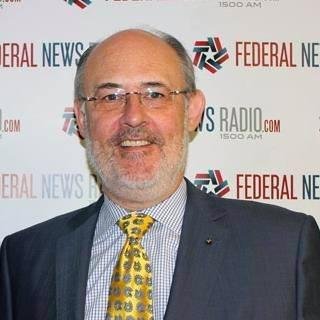
Ronald “Ron” Marks III is a 38-year veteran of the U.S. Intelligence Community. A former CIA case officer, he was a CIA Senate Liaison and Capitol Hill staffer who has served on a number of advisory groups at the Central Intelligence Agency and in The Office of the Director of National Intelligence. Marks was Spring 2020 Dole Fellow at the University of Kansas, Robert J. Dole Institute of Politics. Ron will be conducting a series of seven seminars looking at the challenges and new developments effecting “Spying in the Cyber Age.”
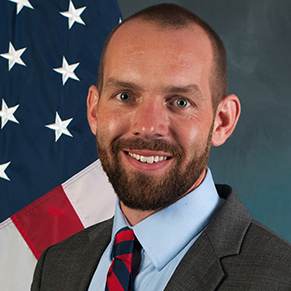
Brian Mazanec serves as an adjunct faculty member at the Schar School of Policy and Government and as director of the Defense Capabilities and Management team in the U.S. Government Accountability Office (GAO). In that role, he is responsible for co-leading the strategic warfare and intelligence portfolio. Mazanec leads and manages multiple teams evaluating a variety of national security programs and activities related to emerging warfare issues; intelligence community management; security and counterintelligence; sensitive activities and programs; personnel vetting; intelligence, surveillance, and reconnaissance; and space policy and operations.
His research interests focus on cyber conflict. Mazanec is the author of the book, The Evolution of Cyber War: International Norms for Emerging-Technology Weapons (University of Nebraska Press, 2015); co-author of Deterring Cyber Warfare: Bolstering Strategic Stability in Cyberspace (Palgrave McMillan, 2014); and Understanding Cyber Warfare: Politics, Policy and Strategy (1st edition graduate textbook, Routledge, 2018), as well as co-editor of Information Warfare in the Age of Cyber Conflict (Routledge, 2020).

Andrew McCabe, a Distinguished Visiting Professor, has a lifetime of service within the Department of Justice, both in the field and as an executive. He brings that experience with him to the Schar School of Policy and Government.
McCabe is an attorney who joined the Federal Bureau of Investigation as a special agent in 1996 and was on the bureau’s SWAT team for a while. In 2003 he became a supervisory special agent, and was promoted to various positions of increasing responsibility over a decade. Nearing the end of his tenure with the FBI, McCabe was promoted to Deputy Director in February of 2016, and served as Acting Director of the FBI after James Comey’s dismissal by President Trump.
McCabe began his career in the FBI Field Office in New York. Once promoted to supervisory special agent, he oversaw the Eurasian Organized Crime Task Force. He has served in other high-profile roles within the bureau, such as the FBI Counterterrorism Division and the FBI National Security Branch. He was also a part of the investigation of the 2013 Boston Marathon bombing and secured the arrest of Ahmed Abu Khattala for his suspected involvement in the 2012 Benghazi attacks.
Andrew McCabe is married to Jill McCabe, a pediatrician who ran for a Virginia state senate seat in 2015. They have two children.
Eric McGlinchey is Associate Professor of Politics and Director of Graduate Studies for George Mason University’s Schar School of Policy and Government. He is the author of Chaos, Violence, Dynasty: Politics and Islam in Central Asia (University of Pittsburgh Press, 2011). His current research investigates international litigation of Central Asian assets and United States policy responses to crises in Eurasia. McGlinchey is the recipient of grants from the National Science Foundation, the U.S. Department of State, The U.S. Department of Education, and the Open Society Institute. McGlinchey received his Ph.D. from Princeton University in 2003. Click here for a list of publications.
James P. Pfiffner is University Professor of Public Policy at George Mason University. His major areas of expertise are the Presidency, American National Government, and Public Management. He has lectured on these topics at universities in Europe and throughout the United States as well as at the Federal Executive Institute, the National War College, the U.S. Military Academy, and at the State, Justice, and Defense Departments. In 2007 he was the S.T. Lee Professorial Fellow in the School of Advanced Study, University of London. He has written or edited a dozen books on the presidency and American National Government, including The Strategic Presidency: Hitting the Ground Running and Power Play: The Bush Presidency and the Constitution. He has also published many articles on the presidency and public management in professional journals, reference works, and the popular press. He has been interviewed regularly by print and electronic media. Professor Pfiffner has been a panel member or on project staffs of the Volcker Commission, the National Academy of Public Administration (of which he is an elected member), the Center for Strategic and International Studies, and the National Academy of Sciences. His professional experience includes service in the Director’s Office of the U.S. Office of Personnel Management (1980-81), and he has been a member of the faculty at the University of California, Riverside and California State University, Fullerton. In 1990 he received the Distinguished Faculty Award at George Mason University. While serving with the 25th Infantry Division (1/8 Artillery) in 1970 he received the Army Commendation of Medal for Valor in Vietnam and Cambodia. Click here for a list of publications.

Dr. David Priess is a visiting professor at George Mason University’s Schar School of Policy and Government and a senior fellow at the Schar School’s Michael V. Hayden Center for Intelligence, Policy, and International Security. A prominent writer and speaker on the presidency, national security, and intelligence, he is also the Publisher of Lawfare, Chief Operating Officer of the Lawfare Institute, and co-host of the Chatter podcast.
Priess, who has a PhD in political science from Duke University, served at the CIA as an intelligence officer, a manager, and a daily intelligence briefer during the presidencies of Bill Clinton and George W. Bush. During the Bush administration, he personally delivered the President’s Daily Brief for more than a year to Attorney General John Ashcroft and FBI Director Robert Mueller and occasionally into the White House.
He has written two books about the US presidency. The first, The President’s Book of Secrets, relates how US intelligence officials brief the commander in chief on the most sensitive information in the world. For this, he became the first author to interview, for one book, every living former President, Vice President, and CIA director from previous administrations. His second book is How To Get Rid of a President: History’s Guide To Removing Unpopular, Unable, or Unfit Chief Executives. Covering American political history from the Constitutional Convention through the election of Donald Trump, it stands as the definitive survey of how presidents have left office.
Priess has appeared often in national media like CNN, MSNBC, Fox News, and NPR to discuss the presidency, national security, and intelligence issues. He has written for the Washington Post, Lawfare, The Bulwark, Foreign Affairs, the Daily Beast, Politico, the Cipher Brief, Foreign Policy, War on the Rocks, and the Houston Chronicle.
Edward Rhodes’s research investigates core questions of American foreign and national security policy and of international behavior. A principal focus of his work has been on the intellectual foundations of America’s engagement with the world outside its borders, particularly on the effect of alternative understandings of liberalism, democracy, and republicanism in shaping American attitudes toward intervention and global involvement. Prior to joining George Mason University, Ed was a member of the faculty of Rutgers University, serving as founding Director of the Rutgers Center for Global Security and Democracy and as Dean of the Social and Behavioral Sciences. (full bio here) Click here for a list of publications.
Juliette Shedd is currently the Associate Dean for Administration at the School for Conflict Analysis and Resolution, George Mason University and teaches both introductory courses and courses on terrorism, extremism, global conflicts, and ideologies. She holds a Ph.D. and M.S. in Conflict Analysis and Resolution from George Mason University and a BA in Political Science and Psychology from George Washington University. Her research includes work on the relationship of media to conflict, specifically focused on media coverage of terrorism and the role of women in political violence. For the last three years she has Co-Directed the Benjamin Franklin Summer Institute with Central Asia, bringing 45 students a year from Central Asia and the U.S. together for a month long training and exchange program. She has shepherded S-CAR’s efforts to increase distance education and overseen a wide range of innovations in experiential and service learning. Click here for a list of publications.
Louise I. Shelley is the Omer L. and Nancy Hirst Endowed Chair for civic intellectual as well as a University Professor in the Schar School of Policy and Government and the founder and Director of the Terrorism, Transnational Crime and Corruption Center (TraCCC) at George Mason University. Her most recent book Dark Commerce: How A New Illicit Economy is Threatening our Future will appear with Princeton University Press in Fall 2018. Her most recent book are Dirty Entanglements: Corruption, Crime and Terrorism (Cambridge University Press, 2014) and Human Trafficking: A Global Perspective (Cambridge, 2010). Dr. Shelley has written books and dozens of articles and books chapters on the subject of transnational crime and corruption. While serving as an initial Andrew Carnegie Fellow 2015-17, she worked on her book on the transformation of illicit trade and how it is undermining sustainability of life and the planet. She served for six years as a member of the Global Agenda Councils on Organized Crime and Illicit Trade of the World Economic Forum. She is a life member of the Council of Foreign Relations and a member of the Global Initiative on Transnational Crime. Dr. Shelley is the recipient of many fellowships and prizes including the Guggenheim, two Fulbrights, two grants from the MacArthur Foundation, and most recently the Carnegie Corporation and the Rockefeller Foundation. Dr. Shelley has testified for the United States Congress repeatedly on these issues and has addressed fora of the OSCE, OECD, NATO and other national and international bodies and appears in the media frequently.
Trevor Thrall is an associate professor of international security in the Schar School of Policy and Government at George Mason University. He is also a Senior Fellow at the Cato Institute in the Defense and Foreign Policy group, where he will be full-time during 2016 and 2017 while on leave from Mason. Dr. Thrall’s research revolves around the intersection of international security, political communication, and public opinion. He is the co-editor of American Foreign Policy and the Politics of Fear (Routledge 2009) and Why Did the United States Invade Iraq? (Routledge 2012) His forthcoming edited volume, The Case for Restraint, examines current U.S. grand strategy and presents leading arguments in favor of a more restrained foreign policy. Thrall also publishes commentary on current affairs in a wide range of publications, including the Philadelphia Inquirer, Detroit News, Huffington Post, Newsweek, Time, The National Interest, and Foreign Policy, and is a frequent guest on radio and television. Prior to arriving at George Mason Thrall taught at the University of Michigan-Dearborn where he also had the honor of directing the MPP and MPA programs in the Department of Social Sciences. Thrall received his Ph.D. in political science from M.I.T. where he was a member of the Security Studies Program. Click here for a list of publications.
Ming Wan is Associate Dean; Professor; Director, Program Faculty in Government and International Affairs; and Director, Political Science Graduate Studies. His Ph.D. was from the Government Department, Harvard University. He has held postdoctoral fellowships at Harvard from the Program on U.S.-Japan Relations, the John M. Olin Institute for Strategic Studies and the Pacific Basin Research Center, and has been a visiting research scholar at Tsukuba University and a George Washington University-Woodrow Wilson International Center for Scholars Luce Fellow in Asian Policy Studies. He was a visiting professor at Keio University of Japan in 2010-2012. He has authored The Asian Infrastructure Investment Bank: The Construction of Power and the Struggle for the East Asian International Order (Palgrave Macmillan, 2016); Understanding Japan-China Relations: Theories and Issues (World Scientific, 2016); The China Model and Global Political Economy: Comparison, Impact, and Interaction (Routledge, 2014); The Political Economy of East Asia: Striving for Wealth and Power (CQ Press, October 2008); Sino-Japanese Relations: Interaction, Logic, and Transformation (Woodrow Wilson Center Press and Stanford University Press, 2006); Human Rights in Chinese Foreign Relations: Defining and Defending National Interests (University of Pennsylvania Press, 2001) and Japan Between Asia and the West: Economic Power and Strategic Balance (M.E. Sharpe, 2001). He has also published in journals such as Asian Survey, Chinese Journal of International Politics, Human Rights Quarterly, Orbis, Pacific Affairs, Pacific Review, and International Studies Quarterly and in edited volumes. His current research interests include International Relations theory, Sino-Japanese relations, and the political economy of East Asia security. Click here for a list of publications.

Erin Wirtanen

Ketian Vivian Zhang is an Assistant Professor of International Security in the Schar School of Policy and Government. Ketian studies rising powers, coercion, economic statecraft, and maritime disputes in international relations and social movements in comparative politics, with a regional focus on China and East Asia. Ketian bridges the study of international relations and comparative politics and has a broader theoretical interest in linking international security and international political economy. Her research agenda emphasizes how globalized production and supply chains affect states’ foreign policy and domestic state-society relations, especially regarding coercion and protests. Ketian’s book project examines when, why, and how China uses coercion when faced with issues of national security, such as territorial disputes in the South and East China Seas, foreign arms sales to Taiwan, and foreign leaders’ reception of the Dalai Lama. Ketian received her Ph.D. in Political Science at the Massachusetts Institute of Technology in 2018, and is also a proud badger.







